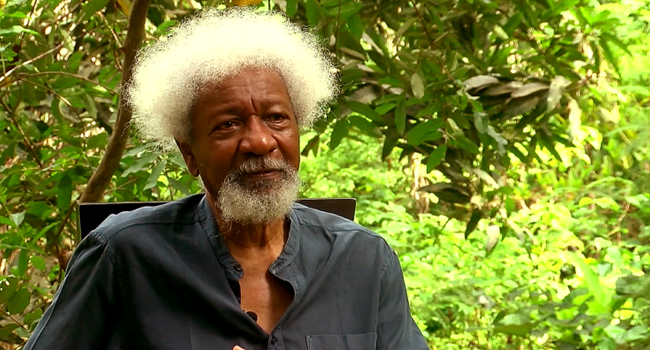Nobel laureate Wole Soyinka has singled out religion as the number one problem hindering Nigerians from being liberated as “rational beings,” IgbereTV reports.

The venerated writer made the comment while speaking recently with a professor of African Literature, Dr. Louisa Egbunike.
“All over the place, I find that religion has been cosseted too much. And liberty has been taken by religionists, which would not be considered to other movements which are considered secularists.
“If you put on a garb of a religious leader, you can close up the expressway between Lagos and the rest of the nation, simply because you are having a religious celebration. You are just a fraction of the rest of the nation. And you should be accorded no special privileges. So, until that is done, people will always find something extra by belonging and manifesting, even to an extreme extent, your religious adhesions.
“Religion has become the number one problem for Nigerians. Hope is all very well; but hope itself can become putrid. Especially if it is hope for unearned advantages in society. If religion becomes an excuse for flouting the law, then that religion has got to be tackled head-on.
“If for instance a legislator, later a Governor, can claim the right to be a pedophile and indulge in cross-border child trafficking, celebrating child marriage, consummating that event, which is against the law of a nation, and he says he has a right to do it because his religion permits it; then both he and that religion should just be shown the way to the law courts and treated like other phenomena of society.
“If you can use religion to excuse building a church which collapses on the head of humanity, many of them not from Nigeria, several from South Africa. And then you say it was caused by supernatural forces when you know very well that you flouted the conditions for increasing the floors of your building.
“So this is what has become the daily reality of Nigerians. So religion has got to be put in its place in order for people to be liberated as rational beings, beings of volition, who can tackle the problems of existence in a rational, collective way, rather than by insisting that it is only along one route that society can be transformed.
“Take a religion, practice it at home, collect around you anybody you want for collective celebration or religious seasons, nobody quarrels with that. But when you use religion to subvert the rights of others, to the extent of primordial rights, to kill, not just singling, but collectively, to burn down the places of worship of others; then it is about time we treated religion as a crime against humanity; it’s reached that level in societies like Nigeria.







